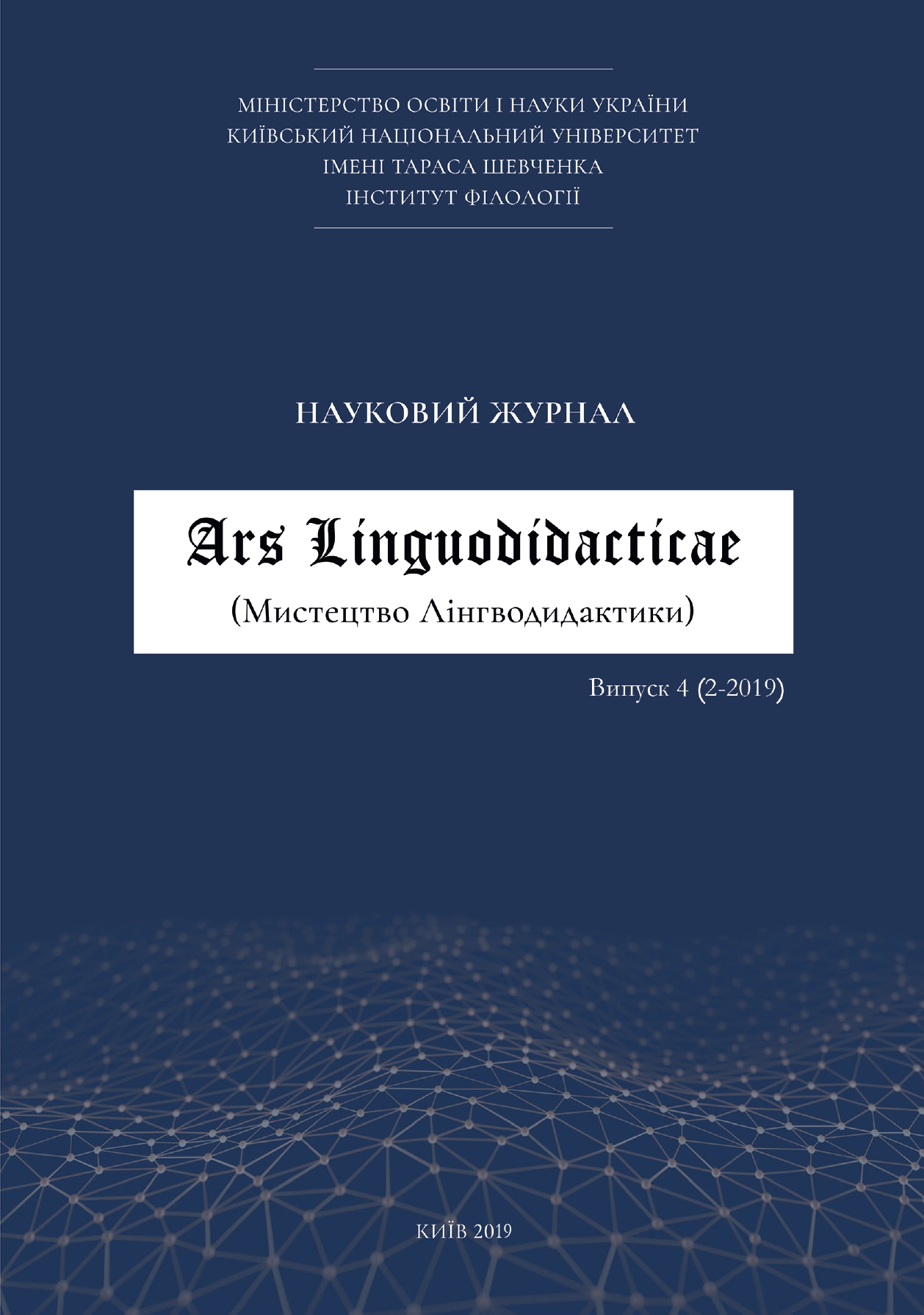MANAGING STUDENTS’ AUTONOMOUS LEARNING OF APOPHATIC CONSTRUCTIONS IN THE SYNTAX OF ANCIENT GREEK
DOI:
https://doi.org/10.17721/2663-0303.2019.4.03Keywords:
independent work, apophatic constructions, syntax of ancient Greek, functional semantics.Abstract
Abstract The goal of university education in Philology is not only to provide students with a certain system of knowledge and develop professional skills in them but also to equip learners with the techniques of independent research. Considering a limited number of publications on teaching classical languages and organization of students’ independent work on learning the syntax of ancient Greek, the author addresses linguistic and pedagogical aspects of organization of independent work of Philology majors in teaching apophatic constructions in ancient Greek.
Purpose. The article aims at giving insight into organization of independent work of Philology majors on learning apophatic constructions in the syntax of ancient Greek and analyzing the dependence of the use of apophatic models on the functional semantics of noun and verb forms.
Results and discussion. The analysis of literature on teaching classical languages and organization of students’ independent work in learning ancient Greek has enabled outlining the features of independent work of Philology majors in learning apophatic constructions in syntax of ancient Greek at different stages and allowed compiling a range of tasks on determining the influence of the syntax on the choice of apophatic model in prose and poetic texts of ancient Greek. Further research might involve experimental testing of the effectiveness of the developed model of the students’ independent work in teaching the syntax of ancient Greek
References
Zvonska L.L. (1999). Vnutrishnya sruktura davnyogrezkoi movy: osoblyvosti funkzionalnogo syntaksysu systemy dieslova (Звонська Л. Л. Внутрішня структура давньогрецької мови: особливості функціонального синтаксису системи дієслова. – К.: УЕЗ, 1999. – 84 с.). Print.
Zvonskaya L.L. (2000). Funkzionalnaya semantika apophqtischeskikh modeley v drevnegrescheskom yazyke (Звонская Л.Л. Функциональная семантика апофатических моделей в древнегреческом языке // Res linguistiсa. – Москва: Academia, 2000. – С. 430-435.). Print.
Zvonska L.L., Shovkovy V.M. (2005). Metodyschna rozrobka dlya samostiinoi roboty z syntaksysu davnyogrezkoi movy (Звонська Л. Л., Шовковий В. М. Методична розробка для самостійної роботи з синтаксису давньогрецької мови. – К.: Видавничий центр КНЛУ, 2005. – 74 с.). Print.
Schepyakova I. Yu. (2015). Navschannya majbutnikh philologiv pokhidnykh diyesliv davnyogrezkoi movy (Чепякова І. Ю. Навчання майбутніх філологів похідних дієслів давньогрецької мови: автореферат дис. … кандидата педагогічних наук: 13.00.02 / Чепякова Інна Юріївна; Київськ. нац. ун-т ім. Тараса Шевченка. – Київ, 2015. – 22 с.). Print.
Shovkovy V.M. (2005). Metodyka vykladannya klasyschnykh mov (Шовковий В. М. Методика викладання класичних мов. – К.:Київський національний університет імені Тараса Шевченка, 2005. – 58 с.). Print.
Shovkovy V.M. (2004). Metodyschni osnovy zastosyvannya vzayemozistavnogo metodu v navschanni gramatyky klasyschnykh mov (Шовковий В. М. Методичні основи застосування взаємозіставного методу в навчанні граматики класичних мов: автореферат дис. … кандидата педагогічних наук: 13.00.02 / Шовковий Вячеслав Миколайович; Київськ. нац. ун-т ім. Тараса Шевченка. – Київ, 2004. – 21 с.). Print.
Downloads
Published
How to Cite
Issue
Section
License
Copyright (c) 2019 Олеся Звонська

This work is licensed under a Creative Commons Attribution-ShareAlike 4.0 International License.
This work is licensed under a Creative Commons Attribution-NonCommercial 4.0 International License.
Copyright policy according to the terms of the license: Creative Commons "Attribution-NonCommercial" 4.0 International (CC BY-NC 4.0).
Authors who publish their articles in "Ars Linguodidacticae" (Open Access Journal) retain the following rights:
- The authors retain the copyright of their article and grant the Ars Linguodidacticae journal the right to first publish the manuscript of their article under the Creative Commons (CC BY-NC 4.0) Attribution License, which allows others to freely distribute the published work with mandatory reference to the author of the original work and first original publication in the Ars Linguodidacticae journal. An indication of the retention of the copyright of the work is provided on the title page of the article.
- The authors reserve the right to enter into separate contracts for the non-exclusive distribution of their article as published in Ars Linguodidacticae (e.g., placing the article in electronic libraries, archives and catalogs or publishing it as part of institute collections and monographs), provided that a full reference to the first original publication in Ars Linguodidacticae is given.
- The policy of the "Ars Linguodidacticae" journal allows and encourages authors to post a manuscript both before and during editorial processing, as this promotes productive scientific discussion and has a positive effect on the speed and dynamics of citing the article.
The editorial board reserves publishing rights to:
- the collated original articles and to the entire issue of the journal.
- the design of the journal and original illustrative and supplementary materials.
- the reprint reprints of the Journal in printed and electronic form.
The copyright policy is carried out according to the terms of the license: Creative Commons "Attribution-NonCommercial" 4.0 International (CC BY-NC 4.0).
For more information, please read the full text of the CC BY-NC 4.0 Public License.
Creative Commons Attribution-NonCommercial 4.0 International License.


